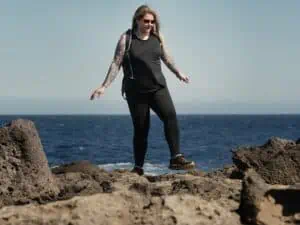This guide is part of The Wellbeing Toolkit in partnership with Shady Rays Impact, for more articles within this guide, visit the main resource hub.
About Shady Rays Impact: Shady Rays Impact is the charitable giving foundation for Shady Rays. They never wanted to settle for being a company that just sells sunglasses – they want to make a difference every day. Through research and talking directly to their fans, Shady Rays found the causes that give purpose to their work. Together, Shady Rays is helping people live healthy, courageous lives through some of their most challenging moments.So far, they’ve provided more than 25 million meals to fight hunger across America and removed millions of plastic bottles from our world’s oceans.Making an impact matters…and they’re just getting started.
Our connection to nature is incredibly important – not only does it have the ability to help us mentally, but it can also have a great impact on our physical wellbeing too. You’re maybe someone who has felt the intentionality that comes from time spent outdoors for years, or perhaps you’re someone who simply enjoys the experience of seeing new places and learning about the world around them. Whatever that connection holds for you, it’s an important one and has the ability to help us lead more compassionate and connected lives. Getting outdoors can allow us to take an important breather when we have an upcoming deadline and are lacking inspiration. It can allow us the space to think and feel our emotions and it can allow us an open space to have important conversations.
The experience of play, and how it connects to joy and happiness can help us to feel like we have a bigger part to play and can give us real drive in life. There’s a good chance that as you’ve spent more time outdoors, your goals and interests in the outdoors have developed – and this can be a great confidence booster and help give you something to work towards. Of course, all experiences in the outdoors are valid, but this can get out of balance and if we’re constantly looking to complete goals and push harder each time, we can lose out on experiencing simplistic pleasures as something we don’t have time for.
When we connect our sense of purpose to the time we spend enjoying nature, our leisure time and relaxation, we’re often in pursuit of something we don’t have right now. We want to achieve ‘x’ thing in order to feel a greater sense of joy and happiness and this can have us start to equate our worth and meaning through how great (or not so great) our sense of purpose is. We often spend so long fixated on what we want to bring into our lives and how we want to feel at a certain point, that we move our focus away from what is happening for us right here and now. We’re so focused on the goal that we can forget to take in the scenery along the way too.
But what if the sense of purpose that we attach to our goals in the outdoors can also balance with a more simplistic sense of play in nature too? What if we could take some of that pressure off ourselves in order to feel a greater sense of balance and enjoyment?
So how can you feel a greater sense of balance when it comes to your understanding of purpose, joy and happiness and how can your time outdoors be a greater reflection of that? How can we allow ourselves to feel a balanced sense of joy in nature?
Below, we’ve outlined a number of action points to help you rebalance and experience play that bit more often in the outdoors:
Table of Contents
ToggleThe balance of being
How many times do you visit somewhere with a whole load of mapped out ideas or a particular place you want to go and experience something? We get it –it’s hard not to. But it’s also important to try and give yourself time to simply be, to experience, change direction and explore places you didn’t even know existed. If you’re new to this, a local space that you know well can be the perfect first step. Try somewhere that allows you to focus on a number of things (such as a park or a hike you know well, for example) and really focus on being in the space. Think about what you can see, hear and smell. Look at the little details you see like frosty leaves or light whisking over a mountain top. There is no right or wrong here, and in essence, it’s about reconnecting to that inner child – that simplistic form of exploration. When we allow ourselves moments like this, we are essentially having a mindful experience away from the day-to-day concerns or worries we might have. This has the power to be extremely regenerative.
Being in the moment
There is no right or wrong way to be in the moment, it’s simply about taking the pressure off and finding that sense of fun and freedom from gentle, simple acts of connection. Set aside some time to spend exploring in a simplistic way with no goals or achievements in mind and notice what it is you really enjoy in that experience. Try to keep in mind the little things you notice – both in your environment and how that makes you feel and allow that to guide your experience. Having no prerequisites of this gentle connection time will really allow you to focus on time away from who you feel you need to be or what you feel you need to do within your day to day. If you’re finding it hard to focus on being mindful in your environment, try to think of reasons why this may be the case. Sometimes this can be down to how you feel at the time, but it can also be down to your environment or what you’re bringing into this space.
“To me, there are three things we all should do every day. Number one is laugh: you should laugh every day. Number two is think: you should spend some time in thought. And number three is you should have your emotions moved to tears. Could be happiness or joy but think about it. If you laugh, you think, and you cry, that’s a full day. That’s a heck of a day. You do those seven days a week, you’re going to have something special.”
— Jim Valvano, V Foundation for Cancer Research
Remove the need to compare
When we focus on staying in our own lane with what we’re doing, we’re less likely to compare ourselves to others. Staying in our own lane also has the ability to allow you to really enjoy your experiences so much more, away from the need to compare what you’re doing to other people, or even ourselves. An attention to mindfulness and listening to what you really need will help tremendously with this – as will remembering that your experiences are valid and unique just the way they are.
What makes you feel good?
When you’re exploring your experience of play, fun and looking at what it is that lights you up and makes you feel good in nature and the outdoors, try to get really acquainted with how you feel. If something doesn’t make you feel great, analyse why that was. Was there something that could be changed next time to make that feel better for you? If you really enjoyed something, what was it about it? Connecting to how we feel about the different things we’re exploring can really help us to make decisions about what’s next or where we want to head and can help us feel a lot more in control of our experience.







